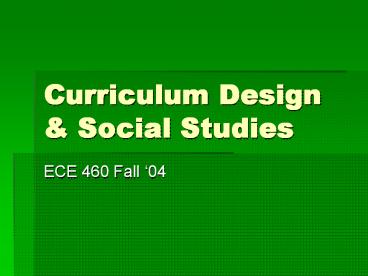Curriculum Design - PowerPoint PPT Presentation
1 / 16
Title:
Curriculum Design
Description:
Every child required to complete the same activity. No cute themes ... Avoid themes on holidays. Avoid materials and activities that scare children ... Activity ... – PowerPoint PPT presentation
Number of Views:646
Avg rating:3.0/5.0
Title: Curriculum Design
1
Curriculum Design Social Studies
- ECE 460 Fall 04
2
Curriculum Planning
- Select a topic
- Select objectives
- Select and organize content
- Choose appropriate learning experiences
- Determine a sequence
- Determine how to assess both growth and program.
Both summative and formative.
3
Integrated Curriculum
- In-depth exploration of a topic with more than
superficial coverage. - More choices and more motivation to learn
- More active learning
- An opportunity for the teacher to learn along
with the children - A more effective use of time for teacher and
student
4
Selecting a topic
- The topic must be worthy of study. It should take
several weeks to complete. - The theme should be one that relates to the TEKS.
- The topic should be of interest and relevant to
the learners - There should be an application of skills
- Must be adequate resources
5
Themes
- Can be done poorly
- No real content
- No previous knowledge of children
- Every child required to complete the same
activity - No cute themes
- Apples is cute but not relevant
- Themes for your class must meet your childrens
needs.
6
Objectives
- Objectives help achieve the purpose of the
specific study. - Should not be broad or too vague
- Should not be too narrow.
7
Selecting activities
- Deciding sequence of activities that will be most
beneficial to the chidlren - Field trip- first hand experience
- Models-second hand
- Pictures-second hand
- Books-second hand
8
Implementing a theme
- Brainstorming
- Emerging curriculum
- Following the childs lead
- Reggio Emilia
- Child-centered curriculum
9
Social Studies
- Look at the TEKS for the grade level you have.
- What big ideas are you seeing?
- What aspects of those ideas can be embedded into
other content areas? - Use your planning web to think about how the
theme could evolve - Is it relevant? Is it interesting? How can you
make it flow?
10
Social Studies
- 3 views
- Integration into daily lives
- Children do not need a content area
- Settle disputes, work out turn taking, establish
systems to live and work together, social studies
is taking place - Content area
- Combination of the two views
11
Organization of Social Studies Curriculum
- Expanding curriculum
- Individual, individual in a group, community,
state, nation and world - 10 important themes
- Culture
- Time, continuity and change
- People, places and environments
- Individual development and identity
- Individuals, groups, and institutions
- Power, authority and governance
- Production, consumption and distribution
- Science, technology, and society
- Global connections
- Civic ideals and practices
12
Constructivist views
- Concept understanding
- Why concepts are important?
- Why depth is better than amount?
- How depth helps with amount?
- Developmental Stages!
13
Social Development
- Helping children participate appropriately in
discussion - Helping children learn to negotiate and
compromise - Helping children learn to assert their own
preferences more gracefully - Conflict management and conflict resolution
14
Holidays
- Talk about some holidays instead of celebrating
each one. - Fit celebrations into regular routines
- Avoid themes on holidays
- Avoid materials and activities that scare
children - Offer activities that calm children and focus on
process - Offer activities that are holiday related as well
as not being holiday related
15
Multicultural Curriculum
- Teaching respect for all cultures
- Learning about ones own culture and other
cultures - Goals
- Children will develop strong identity of
themselves, as members of a group - Children will develop a sense of solidarity
- Chidlren will become critical thinkers
- Children will be confident and persistent problem
solvers - Children will gain the academic skills that will
give them access to the knowledge of our society
and power to make a difference
16
Activity
- Choose a concept in social studies and plan a
developmentally appropriate experience for each
age group. - 3-4
- 5-6
- 7-8
- Activities must engage the learner































